Undir XII. alheimsfrið
(eins og fólk mun kannast við).
eftir blóðug öfgaspor
endursteyptist menning vor.
Heimsbygd öll var eydd að grunni,
Uppi stóð ei tré né runni.
Bældir heimsins blómsturgarðar.
Brotnir heimsins minnisvarðar.
Lægra en dýr með loðinn bjór
lagðist mannkind smá og stór
Horfin von, með hlýðni þrotna,
hundar sviku lánadrottna.
Sótti á bágstatt mannmyn margur
meinkvikinda stefnivargur.
Músik-, bóka- og myndalaus
manneskjan sat með kindahaus,
gleði-, dáða- og girndalaus.
Glötunin virtist þindarlaus…
Pótentátar XII. stríðsins,
tórandi enn á meðal lýðsins,
mundu orðin ekki par
út af hverju stríðið var.
Hvort til annars drós og drengur
dreymdum augum renndu ei lengur,
heldur gláptu öndverð á:
Ástin sjálf var lögzt í dá…
Ein síns liðs á víðavangi
vorkvöld eitt var telpa á gangi
og hún fann á sínu sveimi:
Síðasta blóm í heimi.
Heim hún stökk þá sögu að segja
að síðasta blómið væri að deyja.
Ungum pilti út í haga
einum fannst það markverð saga.
Saman forðuðu sveinn og meyja
síðasta blóminu frá að deyja.
Í heimsókn komu, að heilsa því,
hunangsfluga og kólibrí.
Bráðum urðu blómin tvö
og blómin tvö að fjórum,
fimm, sex, sjö… …
og síðast breiðum stórum.
Laufgast tók hvert tré og lundur.
(Telpan fékk sér snyrtingu).
Piltinum fanns hún alheims undur.
Ástin var í birtingu.
Börnin tóku að hoppa og hlæja
hnellin, keik og létt á brá.
Hundar snéru heim til bæja
(hefði verið að ræða um þá).
Ungi maðurinn framtaksfús
fór að byggja úr steinum hús,
og senn fóru allir að hlaða og hýsa,
og heimsins byggðir að endurrísa,
og söngvar lífsins upphófust menn,
Og fram komu fiðlarar
og fjölbragðamágusar
og skraddarar og skóarar
og skáld og listamenn,
höggmeistarar, hugvitsmenn
og hermenn!
Og aftur komu ofurstar
og aftur risu upp kapteinar
og majorar og marskálkar
og mannkynslausnarar!
Niður í dölum, fram til fjalla
fólk sér dreifði um veröld alla.
En fyrr en varði fjallahyggja
fór að sækja á dalabyggja,
Og þeir sem áttu heima á hæðum
hugan sveigðu að lægri gæðum.
Lýðinn ærðu í lygaskaki
lausnarar, með guð að baki,
Unz eftir skamm hríð
hófst alheimsstríð.
Í stríði því var öllu eytt
ekki neitt
lifði af þann lokadóm,
nema einn piltur
nema ein telpa
nema eitt lítið blóm.
(eins og fólk mun kannast við).
eftir blóðug öfgaspor
endursteyptist menning vor.
Heimsbygd öll var eydd að grunni,
Uppi stóð ei tré né runni.
Bældir heimsins blómsturgarðar.
Brotnir heimsins minnisvarðar.
Lægra en dýr með loðinn bjór
lagðist mannkind smá og stór
Horfin von, með hlýðni þrotna,
hundar sviku lánadrottna.
Sótti á bágstatt mannmyn margur
meinkvikinda stefnivargur.
Músik-, bóka- og myndalaus
manneskjan sat með kindahaus,
gleði-, dáða- og girndalaus.
Glötunin virtist þindarlaus…
Pótentátar XII. stríðsins,
tórandi enn á meðal lýðsins,
mundu orðin ekki par
út af hverju stríðið var.
Hvort til annars drós og drengur
dreymdum augum renndu ei lengur,
heldur gláptu öndverð á:
Ástin sjálf var lögzt í dá…
Ein síns liðs á víðavangi
vorkvöld eitt var telpa á gangi
og hún fann á sínu sveimi:
Síðasta blóm í heimi.
Heim hún stökk þá sögu að segja
að síðasta blómið væri að deyja.
Ungum pilti út í haga
einum fannst það markverð saga.
Saman forðuðu sveinn og meyja
síðasta blóminu frá að deyja.
Í heimsókn komu, að heilsa því,
hunangsfluga og kólibrí.
Bráðum urðu blómin tvö
og blómin tvö að fjórum,
fimm, sex, sjö… …
og síðast breiðum stórum.
Laufgast tók hvert tré og lundur.
(Telpan fékk sér snyrtingu).
Piltinum fanns hún alheims undur.
Ástin var í birtingu.
Börnin tóku að hoppa og hlæja
hnellin, keik og létt á brá.
Hundar snéru heim til bæja
(hefði verið að ræða um þá).
Ungi maðurinn framtaksfús
fór að byggja úr steinum hús,
og senn fóru allir að hlaða og hýsa,
og heimsins byggðir að endurrísa,
og söngvar lífsins upphófust menn,
Og fram komu fiðlarar
og fjölbragðamágusar
og skraddarar og skóarar
og skáld og listamenn,
höggmeistarar, hugvitsmenn
og hermenn!
Og aftur komu ofurstar
og aftur risu upp kapteinar
og majorar og marskálkar
og mannkynslausnarar!
Niður í dölum, fram til fjalla
fólk sér dreifði um veröld alla.
En fyrr en varði fjallahyggja
fór að sækja á dalabyggja,
Og þeir sem áttu heima á hæðum
hugan sveigðu að lægri gæðum.
Lýðinn ærðu í lygaskaki
lausnarar, með guð að baki,
Unz eftir skamm hríð
hófst alheimsstríð.
Í stríði því var öllu eytt
ekki neitt
lifði af þann lokadóm,
nema einn piltur
nema ein telpa
nema eitt lítið blóm.
Contributed by Rikarður V. Albertsson - 2014/2/17 - 03:30
Language: Italian
Traduzione italiana / Þýtt hefur á ítölsku / Italian translation / Traduction italienne / Italiankielinen käännös:
Riccardo Venturi, 13-12-2020 19:36
Riccardo Venturi, 13-12-2020 19:36
L'ultimo fiore al mondo
Durante la XII Pace Mondiale
(come la gente di certo saprà),
dopo un sanguinoso collasso
la nostra civiltà è stata rimodellata.
Tutto il mondo era stato raso al suolo,
non c'eran più né un albero, né un cespuglio.
Abbattuti i giardini del mondo.
Le opere d'arte del mondo, distrutte.
Gli uomini, in pelose pelli di castoro,
piccoli e grandi, divennero inferiori alle bestie;
perduta la speranza, assuefatti a obbedire,
i cani abbandonavano i loro ex padroni.
Parecchi lupacci bastardi andarono
a fare una visita dove stavano i derelitti.
Senza più musica, né libri, né fotografie
la gente stava lì a non far nulla,
senza più gioie, né piacere e né desideri.
La desolazione sembrava infinita...
I potentati della XII Guerra Mondiale
se ne stavan là ancora in mezzo alla gente,
e non dicevano nemmeno due parole
sul perché la guerra era scoppiata.
I ragazzi e le ragazze non correvan più
guardandosi con occhi sognanti,
ma invece si fissavan l'un l'altra :
anche l'amore era andato in coma.
Una volta, in piena campagna, una fanciulla
passeggiava una sera di primavera,
e, cammina cammina, trovò
l'ultimo fiore rimasto al mondo.
Corse a casa per raccontare
che l'ultimo fiore stava per morire;
a un ragazzo che stava fuori al pascolo
questa parve una storia straordinaria.
Insieme, il ragazzo e la ragazza salvarono
l'ultimo fiore dalla morte.
E vennero a salutarlo in visita
un'ape e un colibrì.
Presto i fiori divennero due
e i due fiori divennero quattro,
cinque, sei, sette...
e, infine, tanti e tanti ancora.
Ogni albero e ogni boschetto
cominciò a mettere foglie
(la ragazza era andata a farsi bella).
Al ragazzo sembrava una meraviglia dell'universo:
stava nascendo l'amore.
I bambini cominciarono a saltare e ridere
paffuti, dritti e con lo sguardo grazioso.
I cani tornarono a casa alle fattorie
(su di loro ci sarebbe stato da dire qualcosa).
Il giovane assai intraprendente
si mise a costruire una casa in pietra,
nel mondo cominciarono a sorgere di nuovo edifici
e la gente innalzò canti di vita,
E poi arrivarono violinisti
e maghi, e prestigiatori,
e sarti, e calzolai,
e poeti, e artisti,
scultori, inventori
e militari!
E poi di nuovo colonnelli
e rispuntarono capitani
e maggiori, e marescialli,
e salvatori dell'umanità!
Giù nelle valli, su fino ai monti.
la gente si sparse per tutto il mondo,
finché i montanari non cominciarono
a attaccare chi viveva nelle valli,
E quelli che vivevan sulle alture
non desideraron vivere in posti più bassi.
E la gente fecero ridiventar pazza
i salvatori, con dio a fianco.
Finché, dopo un po',
non cominciò la guerra mondiale.
In quella guerra tutto fu distrutto,
niente
sopravvisse a quel giudizio finale,
tranne un ragazzo,
tranne una ragazza
e un piccolo fiore.
Durante la XII Pace Mondiale
(come la gente di certo saprà),
dopo un sanguinoso collasso
la nostra civiltà è stata rimodellata.
Tutto il mondo era stato raso al suolo,
non c'eran più né un albero, né un cespuglio.
Abbattuti i giardini del mondo.
Le opere d'arte del mondo, distrutte.
Gli uomini, in pelose pelli di castoro,
piccoli e grandi, divennero inferiori alle bestie;
perduta la speranza, assuefatti a obbedire,
i cani abbandonavano i loro ex padroni.
Parecchi lupacci bastardi andarono
a fare una visita dove stavano i derelitti.
Senza più musica, né libri, né fotografie
la gente stava lì a non far nulla,
senza più gioie, né piacere e né desideri.
La desolazione sembrava infinita...
I potentati della XII Guerra Mondiale
se ne stavan là ancora in mezzo alla gente,
e non dicevano nemmeno due parole
sul perché la guerra era scoppiata.
I ragazzi e le ragazze non correvan più
guardandosi con occhi sognanti,
ma invece si fissavan l'un l'altra :
anche l'amore era andato in coma.
Una volta, in piena campagna, una fanciulla
passeggiava una sera di primavera,
e, cammina cammina, trovò
l'ultimo fiore rimasto al mondo.
Corse a casa per raccontare
che l'ultimo fiore stava per morire;
a un ragazzo che stava fuori al pascolo
questa parve una storia straordinaria.
Insieme, il ragazzo e la ragazza salvarono
l'ultimo fiore dalla morte.
E vennero a salutarlo in visita
un'ape e un colibrì.
Presto i fiori divennero due
e i due fiori divennero quattro,
cinque, sei, sette...
e, infine, tanti e tanti ancora.
Ogni albero e ogni boschetto
cominciò a mettere foglie
(la ragazza era andata a farsi bella).
Al ragazzo sembrava una meraviglia dell'universo:
stava nascendo l'amore.
I bambini cominciarono a saltare e ridere
paffuti, dritti e con lo sguardo grazioso.
I cani tornarono a casa alle fattorie
(su di loro ci sarebbe stato da dire qualcosa).
Il giovane assai intraprendente
si mise a costruire una casa in pietra,
nel mondo cominciarono a sorgere di nuovo edifici
e la gente innalzò canti di vita,
E poi arrivarono violinisti
e maghi, e prestigiatori,
e sarti, e calzolai,
e poeti, e artisti,
scultori, inventori
e militari!
E poi di nuovo colonnelli
e rispuntarono capitani
e maggiori, e marescialli,
e salvatori dell'umanità!
Giù nelle valli, su fino ai monti.
la gente si sparse per tutto il mondo,
finché i montanari non cominciarono
a attaccare chi viveva nelle valli,
E quelli che vivevan sulle alture
non desideraron vivere in posti più bassi.
E la gente fecero ridiventar pazza
i salvatori, con dio a fianco.
Finché, dopo un po',
non cominciò la guerra mondiale.
In quella guerra tutto fu distrutto,
niente
sopravvisse a quel giudizio finale,
tranne un ragazzo,
tranne una ragazza
e un piccolo fiore.
Language: English
English version / Þýtt hefur á ensku / Versione inglese / Version anglaise / Englanninkielinen versio:
Riccardo Venturi 13-12-2020 23:12
Translator's Note. James Thurber's poem The Last Flower was written in 1939: that's the reason why, and there's nothing to be added. One peculiarity of the poem is that it has inspired and originated two songs in two different languages: Italian (L'uomo, la donna e il fiore) and Icelandic (Síðasta blóm í heimi). This is the page of the Icelandic song. Though contributed in 2014, it had never been translated in any language whatsoever. The page includes now an Italian translation (a word-for-word one) and this English version, much further removed from the Icelandic lyrics written by Magnús Ásgeirsson (and not fully respecting the poem's layout) but, hopefully, without betraying the Icelandic poem's spirit and meaning. [RV]
Riccardo Venturi 13-12-2020 23:12
Translator's Note. James Thurber's poem The Last Flower was written in 1939: that's the reason why, and there's nothing to be added. One peculiarity of the poem is that it has inspired and originated two songs in two different languages: Italian (L'uomo, la donna e il fiore) and Icelandic (Síðasta blóm í heimi). This is the page of the Icelandic song. Though contributed in 2014, it had never been translated in any language whatsoever. The page includes now an Italian translation (a word-for-word one) and this English version, much further removed from the Icelandic lyrics written by Magnús Ásgeirsson (and not fully respecting the poem's layout) but, hopefully, without betraying the Icelandic poem's spirit and meaning. [RV]
The Last Flower in the World
During World Peace XII
(As people certainly know),
Our collapsed civilization
has been cruelly reshaped.
The whole world was in ruins,
No more trees, no more bushes.
All the gardens were torn down,
All the works of art, destroyed.
Men and women, in beaver skins,
Had become viler than beasts;
Even dogs had lost their hopes
And, though used to obedience,
Had abandoned their masters.
Packs of wicked wolves went
To pay visits to poor homesteads
Where destitute people lived.
No more music, no more books,
No more pictures, no more joys,
No pleasures, no desires,
Only endless desolation,
Lives spent in doing nothing...
The powers of World War XII
Were still there, among the people;
They didn't even say why the heck
That cursed war had broken out.
Boys and girls no longer dreamed
Glancing at each other's eyes,
But instead they stood there staring:
Love had passed from the earth.
Once, one fine evening in spring,
A girl strolling through the fields
Found, while walking, a tiny flower:
The last flower in the world.
She ran home to tell her folks
That the flower was moribund;
A boy out there in the pasture
Was amazed at this story.
So the boy and the girl together
Saved the last flower from death.
Then, a bee and a hummingbird
Came to greet it on a visit.
Soon one flower became two,
And two flowers became four,
And then five, six, seven, eight...
And then many, many more.
Every tree and every grove
Began then to leaf out,
The girl with a touch of make-up
Was a wonder of the world,
And the boy fell deeply in love,
Love was on earth again.
Children started jumping, laughing,
Plump, straight, with a pretty look.
The dogs returned to their farms,
But this is another story.
The resourceful young man
Started building a stone house,
Buildings stood again in the world,
Songs of life were heard again.
And then there came fiddlers
And magicians, and conjurers,
And tailors, and shoemakers,
And poets, and artists,
Sculptors, inventors,
And, of course, soldiers!
And then again colonels,
Captains, majors, lieutenants,
Marshals, brigadiers, generals
And saviors of humanity!
Down in valleys, up in highlands
People spread all over the world,
Until the highlanders began
To attack the dalesmen.
Well, the highlanders longed so strongly
For living in much lower places,
The saviors had God on their side
And drove the people crazy again.
Short time passed; very soon
A new world war broke out.
Everything was destroyed,
Nothing survived that doom.
Except one boy,
Except one girl,
Except one flower.
During World Peace XII
(As people certainly know),
Our collapsed civilization
has been cruelly reshaped.
The whole world was in ruins,
No more trees, no more bushes.
All the gardens were torn down,
All the works of art, destroyed.
Men and women, in beaver skins,
Had become viler than beasts;
Even dogs had lost their hopes
And, though used to obedience,
Had abandoned their masters.
Packs of wicked wolves went
To pay visits to poor homesteads
Where destitute people lived.
No more music, no more books,
No more pictures, no more joys,
No pleasures, no desires,
Only endless desolation,
Lives spent in doing nothing...
The powers of World War XII
Were still there, among the people;
They didn't even say why the heck
That cursed war had broken out.
Boys and girls no longer dreamed
Glancing at each other's eyes,
But instead they stood there staring:
Love had passed from the earth.
Once, one fine evening in spring,
A girl strolling through the fields
Found, while walking, a tiny flower:
The last flower in the world.
She ran home to tell her folks
That the flower was moribund;
A boy out there in the pasture
Was amazed at this story.
So the boy and the girl together
Saved the last flower from death.
Then, a bee and a hummingbird
Came to greet it on a visit.
Soon one flower became two,
And two flowers became four,
And then five, six, seven, eight...
And then many, many more.
Every tree and every grove
Began then to leaf out,
The girl with a touch of make-up
Was a wonder of the world,
And the boy fell deeply in love,
Love was on earth again.
Children started jumping, laughing,
Plump, straight, with a pretty look.
The dogs returned to their farms,
But this is another story.
The resourceful young man
Started building a stone house,
Buildings stood again in the world,
Songs of life were heard again.
And then there came fiddlers
And magicians, and conjurers,
And tailors, and shoemakers,
And poets, and artists,
Sculptors, inventors,
And, of course, soldiers!
And then again colonels,
Captains, majors, lieutenants,
Marshals, brigadiers, generals
And saviors of humanity!
Down in valleys, up in highlands
People spread all over the world,
Until the highlanders began
To attack the dalesmen.
Well, the highlanders longed so strongly
For living in much lower places,
The saviors had God on their side
And drove the people crazy again.
Short time passed; very soon
A new world war broke out.
Everything was destroyed,
Nothing survived that doom.
Except one boy,
Except one girl,
Except one flower.
Language: English
James Thurber: The Last Flower
(c) 1939 by James Thurber, The Last Flower, A Parable in Pictures; also A Thurber Carnival, book and play
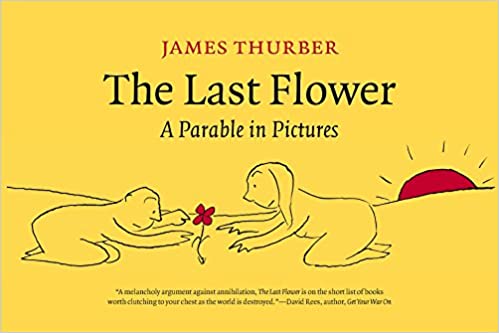
(c) 1939 by James Thurber, The Last Flower, A Parable in Pictures; also A Thurber Carnival, book and play

World War XII, as everybody knows,
Brought about the collapse of civilization
Towns, cities, and villages disappeared from the earth
All the groves and forests were destroyed
And all the gardens
And all the works of art
Men, women, and children became lower than the lower animals
Discouraged and disillusioned, dogs deserted their
fallen masters
Emboldened by the pitiful condition of the former lords
of the earth, rabbits descended upon them
Books, paintings, and music disappeared from the earth,
and human beings just sat around, doing nothing
Years and years went by
Even the few generals who were left forgot what the
last war had decided
Boys and girls grew up to stare at each other blankly,
for love had passed from the earth
One day a young girl who had never seen a flower
chanced to come upon the last one in the world
She told the other human beings that the last flower
was dying
The only one who paid any attention to her was a young
man she found wandering about
Together the young man and the girl nurtured the flower
and it began to live again
One day a bee visited the flower, and a hummingbird,
Before long there were two flowers, and then four, and then
a great many
Groves and forests flourished again
The young girl began to take an interest in how she
looked
The young man discovered that touching the girl was
pleasurable
Love was reborn into the world
Their children grew up strong and healthy and learned
to laugh and run
Dogs came out of their exile
The young man discovered, by putting one stone upon
another, how to build a shelter
Pretty soon everybody was building shelters
Towns, cities, and villages sprang up
Song came back ino the world
And troubadours and jugglers
And tailors and cobblers
And painters and poets
And sculptors and wheelwrights
And soldiers
And lieutenants and captains
And generals and major generals
And liberators
Some people went one place to live, and some another,
Before long, those who went to live in the valleys
wished they had gone to live in the hills
And those who went to live in the hills wished they had
gone to live in the valleys
The liberators, under the guidance of God, set fire
to the discontent
So presently the world was at war again
This time the destruction was so complete...
That nothing at all was left in the world
Except one man
And one woman
And one flower
Brought about the collapse of civilization
Towns, cities, and villages disappeared from the earth
All the groves and forests were destroyed
And all the gardens
And all the works of art
Men, women, and children became lower than the lower animals
Discouraged and disillusioned, dogs deserted their
fallen masters
Emboldened by the pitiful condition of the former lords
of the earth, rabbits descended upon them
Books, paintings, and music disappeared from the earth,
and human beings just sat around, doing nothing
Years and years went by
Even the few generals who were left forgot what the
last war had decided
Boys and girls grew up to stare at each other blankly,
for love had passed from the earth
One day a young girl who had never seen a flower
chanced to come upon the last one in the world
She told the other human beings that the last flower
was dying
The only one who paid any attention to her was a young
man she found wandering about
Together the young man and the girl nurtured the flower
and it began to live again
One day a bee visited the flower, and a hummingbird,
Before long there were two flowers, and then four, and then
a great many
Groves and forests flourished again
The young girl began to take an interest in how she
looked
The young man discovered that touching the girl was
pleasurable
Love was reborn into the world
Their children grew up strong and healthy and learned
to laugh and run
Dogs came out of their exile
The young man discovered, by putting one stone upon
another, how to build a shelter
Pretty soon everybody was building shelters
Towns, cities, and villages sprang up
Song came back ino the world
And troubadours and jugglers
And tailors and cobblers
And painters and poets
And sculptors and wheelwrights
And soldiers
And lieutenants and captains
And generals and major generals
And liberators
Some people went one place to live, and some another,
Before long, those who went to live in the valleys
wished they had gone to live in the hills
And those who went to live in the hills wished they had
gone to live in the valleys
The liberators, under the guidance of God, set fire
to the discontent
So presently the world was at war again
This time the destruction was so complete...
That nothing at all was left in the world
Except one man
And one woman
And one flower
Contributed by Riccardo Venturi - 2020/12/13 - 23:32
×
![]()
Note for non-Italian users: Sorry, though the interface of this website is translated into English, most commentaries and biographies are in Italian and/or in other languages like French, German, Spanish, Russian etc.

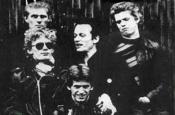
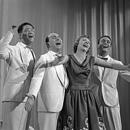


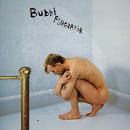
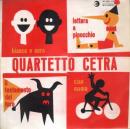

Da una poesia di James Thurber
(Tradotta in islandese da Magnús Ásgeirsson)
Musica: Utangarðsmenn / Bubbi Morthens
Album: Í upphafi skyldi endinn skoða
From a poem by James Thurber
(Translated into Icelandic by Magnús Ásgeirsson)
Music: Utangarðsmenn / Bubbi Morthens
Album: Í upphafi skyldi endinn skoða
Texti: Ljóð eftir James Thurber
Þýðing: Magnús Ásgeirsson
Lag: Utangarðsmenn / Bubbi Morthens
Af plötunni: Í upphafi skyldi endinn skoða
L'ultimo fiore, dal Quartetto Cetra al punk islandese
Che cosa c'entra, secondo voi, una punk band islandese con il Quartetto Cetra? Tutti e due gruppi musicali, d'accordo; ma più diversi sarebbe difficile immaginarseli. Eppure una cosa in comune ce l'hanno: una canzone. Per quanto possa sembrare incredibile, derivata dalla stessa poesia.
La poesia si chiama, in inglese, The Last Flower in the World e fu scritta dal giornalista, umorista e poeta americano James Thurber (1894-1961), noto per la sua attività al New Yorker. Basandosi su di essa, nel 1968, il Quartetto Cetra (con Anton Virgilio Savona che, senz'altro, fu autore del testo) cantò L'uomo, la donna e il fiore; canzone che abbiamo sul sito dal 7 settembre 2009.
La canzone del Quartetto Cetra è piuttosto una trasposizione della poesia di Thurber, che immagina una storia che si svolge nell'anno 5000. Ignoro chi sia stato a tradurla integralmente in italiano; quel che so è che, prima del 1955, dev'essere stata senz'altro tradotta in islandese. Questo perché il traduttore, Magnús Ásgeirsson, nato nel 1901 a Reykir (“fumi” in islandese), era morto nel 1955 a Hafnarfjörður (“fiordo del porto” in islandese), lo stesso anno in cui il famosissimo scrittore Halldór Kiljan Laxness aveva avuto, unico islandese nella storia, il Premio Nobel per la Letteratura.
Nel 1981, una delle più note bande punk-rock islandese, gli Utangarðsmenn (nome che si potrebbe tradurre come “Outsider, Estranei”), scopersero la poesia di Thurber tradotta in islandese, e ne fecero una canzone. Del tutto autonoma, naturalmente, da quella del Quartetto Cetra italiano; ma tratta dalla stessa poesia. Del gruppo faceva parte una nostra vecchia conoscenza: Bubbi Morthens. Uno parecchio sensibile a tematiche pacifiste e antimilitariste, e che in Islanda è una vera e propria star. La canzone fu inserita nell'album Í upphafi skyldi endinn skoða (ovvero qualcosa come “All'inizio si dovrebbe guardare la fine”).
1981: erano i miei “anni islandesi”, chiamiamoli così. Quelli in cui avevo iniziato a scrivere il corso di islandese, il Kennslubók í nútíma íslensku handa ítölum che mi tenne impegnato per ventidue anni e che sembra sia stato un po' apprezzato in giro. Stasera eccomi di ritorno all'islandese grazie a un improbabile “incrocio” tra un poeta e giornalista americano, uno storico e garbato quartetto di musica leggera italiano (con uno dei suoi membri che, di notte, si trasformava in solforoso anarco-comunista scrivendo canzoni al vetriolo) e una punk band di Reykjavík. Sono gli intrecci forniti dalla poesia e dalla musica, e non c'è -in fondo- da stupirsene più di tanto. Quel che si può fare (e questo sito ne dà la possibilità, mettendone a disposizione i risultati) è recuperare tali intrecci. Anche perché è andata a finire che uno degli amministratori del sito è, ad un certo punto della sua vita, "approdato" in Islanda, dove vive. Se mi legge, lo prego di fare un saluto a una delle mie isole, rimastami nel cuore. [RV]